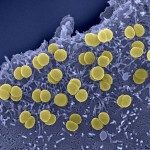Lien vers Pubmed [PMID] – 23373517
Lien DOI – 10.1111/mmi.12153
Mol Microbiol 2013 Mar; 87(5): 1100-12
Peptidoglycan O-acetylation is a modification found in many bacteria. In Gram-positive pathogens, it contributes to virulence by conferring resistance to host lysozyme. However, in Gram-negative pathogens, its contribution to physiology and virulence is unknown. We examined the contribution of patA, patB and ape1 to peptidoglycan O-acetylation in the major human pathogen Neisseria meningitidis (Nm). Using genetic expression of all possible combinations of the three genes in Escherichia coli and Nm, we confirmed that PatA and PatB were required for PG O-acetylation, while ApeI removed the O-acetyl group. ApeI was active on all O-acetylated muropeptides produced by PatA and PatB during heterologous expression in E. coli and was also active on several PG structures in vitro. Interestingly, in Nm, ApeI was found to preferentially de-O-acetylate muropeptides with tripeptide stems (GM3), suggesting that its activity is highly regulated. Accordingly, de-O-acetylation of GM3 regulated glycan chain elongation and cell size. Additionally, the virulence of Nm lacking ApeI was drastically reduced suggesting that regulation of glycan chain length by O-acetylation contributes to bacterial fitness in the host. Altogether, our results suggest that ApeI represents an attractive target for new drug development.



